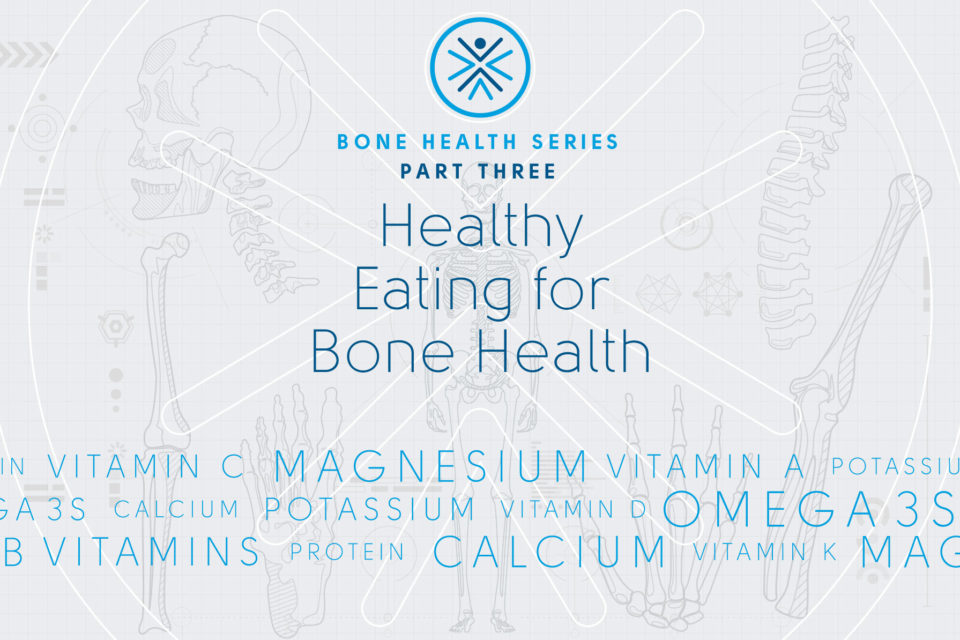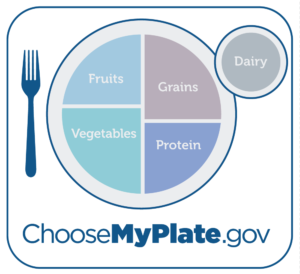Bone Health Series, Part Three of Four: Healthy Eating for Bone Health
By: MJ Fegan, PT, DPT, GCS —
Bone is a rigid body tissue composed primarily of the protein collagen and calcium phosphate. The adult human skeletal system is made up of 206 bones that provide structural support for our bodies.
If our bones are weak, this will compromise our skeletal system and possibly lead to pain, posture changes, and fractures. Studies demonstrate a healthy diet is essential in order to keep our bones strong. Eating nutritious foods, high in calcium, vitamin D, and magnesium to name a few, can promote healthy bones and minimize bone loss.
In our effort to positively influence bone health, it is important to include the following nutrients in our diet:
Protein – Protein is one of the main components of bone (collagen).
Sources include: lean meats, poultry and fish, beans, lentils, tofu, egg whites, shelled nuts, seeds, and dairy products.
Calcium – Calcium is important in building and maintaining strong bones.
Sources include: dairy products, green vegetables, and tofu.
Vitamin D – Vitamin D helps absorb calcium.
Sources include: fish, cheese, and fortified foods (breakfast cereals, juices, milk products, and yogurt).
Potassium – Potassium neutralizes the acids produced during the body’s metabolic processes.
Sources include: sweet potatoes, melon, spinach, prunes, tomatoes, oranges, orange juice, and bananas.
Magnesium – Magnesium works with bone building cells (osteoblasts), and works in conjunction with vitamin D and parathyroid hormone to keep calcium levels normal.
Sources include: green leafy vegetables, nuts, seeds, whole grains, tomato products, artichokes, sweet potatoes, and raisins.
Vitamin C – Vitamin C is essential to the formation of collagen, the foundation that bone mineralization is built on.
Sources include: citrus fruits, green leafy vegetables, melons, strawberries, peppers and Brussels sprouts.
Vitamin A – Vitamin A influences bone cell metabolism.
Sources include: cantaloupe, carrots, kale, mangoes, sweet potatoes, and spinach.
Vitamin K* – Vitamin K helps attract calcium to the bone.
Sources include: prunes, collard greens, spinach, mustard greens, turnip greens and Brussels sprouts.
*Vitamin K affects blood clotting factors. If you are taking a blood thinner, you should consult with your doctor about taking vitamin K supplements or including foods rich in vitamin K to your diet.
B Vitamins – B Vitamins have recently been linked to reducing the risk of fractures.
Sources include: whole grains, meat, eggs and dairy products, legumes (beans, lentils), seeds and nuts, dark, leafy vegetables, and fruits (citrus fruits, avocados, bananas).
Omega-3s — Recent research has found that olive oil, soy beans, blueberries, and foods rich in omega-3s (non-inflammatory fats), like fish oil and flaxseed oil may also have bone boosting benefits.
While all these nutritious foods are important for your bone health, there are also many foods that are detrimental to bone health and should be avoided. Things that should be avoided include:
Salt — Sodium causes your body to lose calcium and can lead to bone loss. Salt is found in: cold cuts, breads, canned foods, processed foods, sauces, salad dressings, cheese, instant soups, bagels, and frozen dinners as well as in the salt shaker.
Colas and some carbonated soft drinks — Phosphorous is thought to increase calcium excretion.
Sugar and refined foods — Sugar increase urinary calcium excretion like phosphorus. Think cakes, candy, canned soup, juices, biscuits, and granola bars.
Trans fats — Trans fats have been found to inhibit Vitamin K absorption in bone. This includes: fried foods, chips, cookies, and pastries.
Caffeine — Caffeine leaches calcium from the bones (tea is the exception). Foods that are high in caffeine include: energy drinks, coffee, chocolate, and colas. Caffeine is also found in many headache and PMS remedies such as Midol, Excedrin, and Bayer aspirin.
Excessive alcohol consumption — Alcohol prevents calcium absorption when consumed in excess. (Aim for no more than 1 per day for women, 2 per day for men.)
Smoking — Tobacco agents have been shown to decrease bone density.
Eating a healthy diet is not only good for our general health and wellbeing but is necessary for bone health. So, follow the tips outlined above and fill your plates using the ChooseMyPlate.gov principles to ensure your bone health!


